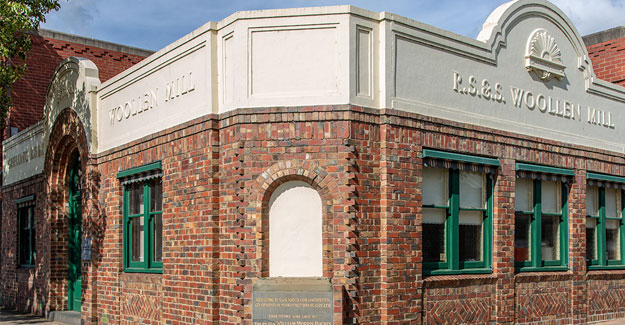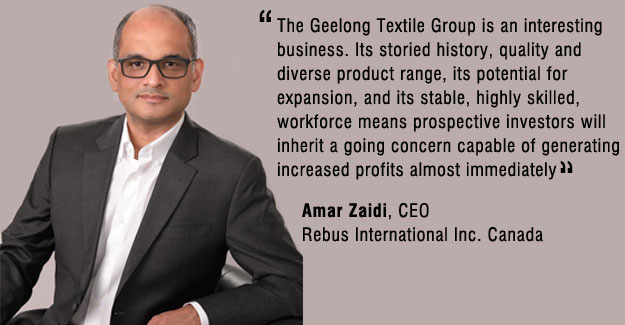
Australia’s Iconic Geelong Textile Group Is Up For Sale
Rebus International Inc. Canada, is charged with finding a buyer for the Geelong Textile Group; which believes that there has never been a better time to look at the Australian textile industry as an investment.
Australia’s iconic Geelong Textile Group is up for sale. This is the company that supplied the material for the Australian Test Cricket teams’ iconic baggy green caps, made famous by every captain including Sir Donald Bradman and Ricky Ponting.The company also supplied the fabric used for the seating in the Sydney Opera House; and the design and manufacture of wool bunting material for Sydney’s AMP Historical Building, which features pure Australian merino wool.
The Geelong mill has operated and specialised in wool fabric since 1920. Today, they continue to create quality upholstery and apparel fabrics for commercial and domestic use. Whether it’s fabric for public transport seats, or school uniforms, the mill has been manufacturing locally for over 100 years.
 The Geelong Textile Group purchased the historic weaving mill in 1971, continuing a long tradition of weaving quality woollen and worsted fabrics from regionally abundant fine merino wool and other quality yarns. Steeped in history, the two entities that comprise the Geelong Textile Group – Geelong Textiles Australia and Geelong Dyeing, are on the market for the first time in over 40 years. Collectively, the two companies form a leading Australian textile solution provider.
Amar Zaidi, CEO of Rebus International Inc. Canada, is charged with finding a buyer for the Group; and says that there has never been a better time to look at the Australian textile industry as an investment.
“The Geelong Textile Group is an interesting business. Its storied history, quality and diverse product range, its potential for expansion, and its stable, highly skilled, workforce means prospective investors will inherit a going concern capable of generating increased profits almost immediately,” Zaidi said.
“For the past 41 years, the Geelong Textile Group has been owned by the Dimmick family. The younger generations have pursued different careers, but they are committed to finding investors for the businesses to ensure continued employment opportunities for the experienced workforce as well as offering the purchasers an established, respected commercial enterprise with current suppliers and customers,” he said.
Since the pandemic circled the globe, every country with a manufacturing base realised that making things at home to protect against disruption to supply chains is vitally important. The textile industry, in particular, has benefitted from increased interest. In 2019, the cost of shipping a container filled with fabric from China was US$ 1,500-2,000. Now it’s US$ 11,500. The extreme rise in freight cost is loaded on to the price of the textiles, which means Australian made materials are, once again, price competitive. Fewer vessels arriving in Australia, because they cannot easily backload, means long lead times for textiles ordered from overseas, which can be supplied from Geelong in days not months.
The company will attract investors who are passionate about Australian textiles, manufactured from Australian wool; and who are interested in the opportunities presented by the reshoring of textile manufacturing to Australia.
Past experience suggests that businesses such as the Geelong Textile Group appeal to textile importers who need to return to local manufacturing to secure their supply chain. There is also huge growth potential for investors, given that Australia’s state and federal governments have learned a hard and expensive lesson that importing textiles is no longer the cheapest, safest, or most timely option. Employment opportunities and security of supply has become a priority for governments everywhere. The Australian government has realised the urgent need to support local manufacturing. Long term, lucrative government contracts used to be the foundation of Australia’s textile industry and in the past 12 months, the indicators are they will be again.
The nature of international textile manufacturing is that over the past 50 years it has evolved from being an amalgam of several companies – each one supplying a specific service – to the Geelong Textile Group model. This combines the design and technical weaving capabilities of Geelong Textiles Australia; and the expertise of Geelong Dyeing in colouration and finishing of various fibres, including Australian wool, cotton, and blended fabrics. This represents a real strength within the Australian textile industry.
Expanding on its core services of commission weaving, dyeing, and finishing, Geelong Weaving Mill has diversified into a wide range of domestic products. Woollen upholstery fabrics and home textiles range, including blankets, tea towels, and fashionable woollen version of the Aussie Flannel ‘Lumberjack’ check shirt, represent a growth market for the company. Geelong Dyeing has also released a stock service making, machine knitting yarn and wool tops available in stock and custom colours, for the craft industry.
The Geelong Textile Group has successfully diversified its customer base and expanded core services and products to include home textiles and upholstery fabrics manufactured from high-quality Australian wool. More recently, the company launched its online presence to cater for the shift to online supply of products to both the domestic and international markets.
“We are anticipating a lot of international interest in the Geelong Textile Group. Australia’s stable economy and regulatory regime are viewed by overseas investors as a safe place to invest their money. Australia’s proximity to over two billion people living in Asia, the majority of which are moving into the middle class and who value Australian premium products, offers a huge opportunity to investors with liquid capitol,” said Zaidi.
In 2020-2021 blankets, home textiles, home upholstery, and tea towels accounted for 14.25% of total sales, this figure is likely to increase to 22% in 2021-2022.
The Geelong Textile Group purchased the historic weaving mill in 1971, continuing a long tradition of weaving quality woollen and worsted fabrics from regionally abundant fine merino wool and other quality yarns. Steeped in history, the two entities that comprise the Geelong Textile Group – Geelong Textiles Australia and Geelong Dyeing, are on the market for the first time in over 40 years. Collectively, the two companies form a leading Australian textile solution provider.
Amar Zaidi, CEO of Rebus International Inc. Canada, is charged with finding a buyer for the Group; and says that there has never been a better time to look at the Australian textile industry as an investment.
“The Geelong Textile Group is an interesting business. Its storied history, quality and diverse product range, its potential for expansion, and its stable, highly skilled, workforce means prospective investors will inherit a going concern capable of generating increased profits almost immediately,” Zaidi said.
“For the past 41 years, the Geelong Textile Group has been owned by the Dimmick family. The younger generations have pursued different careers, but they are committed to finding investors for the businesses to ensure continued employment opportunities for the experienced workforce as well as offering the purchasers an established, respected commercial enterprise with current suppliers and customers,” he said.
Since the pandemic circled the globe, every country with a manufacturing base realised that making things at home to protect against disruption to supply chains is vitally important. The textile industry, in particular, has benefitted from increased interest. In 2019, the cost of shipping a container filled with fabric from China was US$ 1,500-2,000. Now it’s US$ 11,500. The extreme rise in freight cost is loaded on to the price of the textiles, which means Australian made materials are, once again, price competitive. Fewer vessels arriving in Australia, because they cannot easily backload, means long lead times for textiles ordered from overseas, which can be supplied from Geelong in days not months.
The company will attract investors who are passionate about Australian textiles, manufactured from Australian wool; and who are interested in the opportunities presented by the reshoring of textile manufacturing to Australia.
Past experience suggests that businesses such as the Geelong Textile Group appeal to textile importers who need to return to local manufacturing to secure their supply chain. There is also huge growth potential for investors, given that Australia’s state and federal governments have learned a hard and expensive lesson that importing textiles is no longer the cheapest, safest, or most timely option. Employment opportunities and security of supply has become a priority for governments everywhere. The Australian government has realised the urgent need to support local manufacturing. Long term, lucrative government contracts used to be the foundation of Australia’s textile industry and in the past 12 months, the indicators are they will be again.
The nature of international textile manufacturing is that over the past 50 years it has evolved from being an amalgam of several companies – each one supplying a specific service – to the Geelong Textile Group model. This combines the design and technical weaving capabilities of Geelong Textiles Australia; and the expertise of Geelong Dyeing in colouration and finishing of various fibres, including Australian wool, cotton, and blended fabrics. This represents a real strength within the Australian textile industry.
Expanding on its core services of commission weaving, dyeing, and finishing, Geelong Weaving Mill has diversified into a wide range of domestic products. Woollen upholstery fabrics and home textiles range, including blankets, tea towels, and fashionable woollen version of the Aussie Flannel ‘Lumberjack’ check shirt, represent a growth market for the company. Geelong Dyeing has also released a stock service making, machine knitting yarn and wool tops available in stock and custom colours, for the craft industry.
The Geelong Textile Group has successfully diversified its customer base and expanded core services and products to include home textiles and upholstery fabrics manufactured from high-quality Australian wool. More recently, the company launched its online presence to cater for the shift to online supply of products to both the domestic and international markets.
“We are anticipating a lot of international interest in the Geelong Textile Group. Australia’s stable economy and regulatory regime are viewed by overseas investors as a safe place to invest their money. Australia’s proximity to over two billion people living in Asia, the majority of which are moving into the middle class and who value Australian premium products, offers a huge opportunity to investors with liquid capitol,” said Zaidi.
In 2020-2021 blankets, home textiles, home upholstery, and tea towels accounted for 14.25% of total sales, this figure is likely to increase to 22% in 2021-2022.

Textile Excellence
If you wish to Subscribe to Textile Excellence Print Edition, kindly fill in the below form and we shall get back to you with details.












